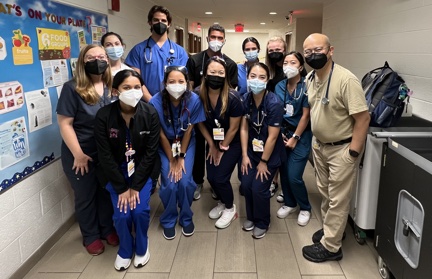Specialty Tracks - Categorical Pediatrics Residency

UMD Pediatric residents, medical students and faculty providing free sports physicals at the SEED School of Maryland (August 2022)
Social Justice Track
The Social Justice Track allows residents with a passion for social justice and diversity, equity, and inclusion to have dedicated weekly time to devote towards this effort. Each participant is expected to engage in activities that seek to engage with our local community in Baltimore, facilitating both health equity and demonstrating to our patient population that we are committed to their health and well-being. Participants also engage in efforts to enhance education within the residency program and across the Department of Pediatrics to improve understanding of anti-racism strategies in healthcare and engage in active de-biasing strategies in healthcare delivery. Our residents are also actively involved in programming for recruitment and mentoring for those residents who identify as Under-represented in Medicine. All residents participating in this track are expected to complete a longitudinal scholarly project under faculty mentorship that works towards social justice efforts.
Global Health Track
In collaboration with faculty from the Center for Vaccine Development and the Institute of Human Virology with Med-Peds and Pediatric faculty leadership, this robust track provides residents with a unique, meaningful experience to gain skills to become highly successful leaders in Global Health.
This track will incorporate a wide range of didactic and clinical experiences to provide a comprehensive, integrated approach to global health including:
- Didactic, interactive lectures by faculty actively involved in global health on issues relevant to public health, research and clinical care
- Mentorship with physicians actively engaged in global health
- A robust curriculum focused on core topics in global health including public health, working in resource poor areas, vaccinology and disaster management
- Participation in a refugee clinic
- Research with mentorship on projects addressing global health issues
- Global health clinical experience (international and/or domestic)
- Resident-led global health focused journal clubs
Advocacy Track
Residents who desire additional experiences in child advocacy can apply for the Advocacy Track. Interested residents develop projects in conjunction with the Track Leader, a faculty member with expertise and experience in child health policy, and one of our many partner agencies in Baltimore, across Maryland, and in Washington, DC. As with the Longitudinal Research Track, applicants must provide detailed descriptions of their proposed projects, letters of support from faculty mentors, and clear explanations of their independent roles in their projects. If accepted, the residents are provided with the same extra time to pursue their projects, which qualify as their required scholarly projects for residency.
Research Track
Residents who want to pursue research in greater depth can apply for the Longitudinal Research Track during their intern year. Interested residents are directed toward faculty members with similar research interests to help them devise a plan. Applicants must provide detailed descriptions of their proposed projects, letters of support from faculty mentors, and clear explanations of their independent roles in their projects. If accepted, residents are allowed an extra half-day per week for approximately half of their second and third years of training to devote to research. Current projects include:
- An Examination of the Effect of Environmental Smoke Exposure on Pediatric Systolic Blood Pressure
- The Pathophysiology of Ureaplasma-Mediated Brain Injury in Preterm Infants
- Immune Response of Patients Receiving Vaccine-Primed T cells and Immunization Against Tumor-Specific Antigens Following Autologous Bone Marrow Transplant.
- Intranasal Vaccinations against Helicobacter pylori in a Mouse Model
Quality Improvement Track
Residents looking for an increased exposure to quality improvement can apply to the Longitudinal Quality Improvement Track during their intern year. Interested residents propose a longitudinal quality improvement project and identify a quality improvement mentor. They become certified IHI quality improvement scholars and present their project at departmental Grand Rounds. They become a member of the departmental quality council and the hospital wide quality improvement council. They are invited to join departmental safety rounds on a monthly basis.

